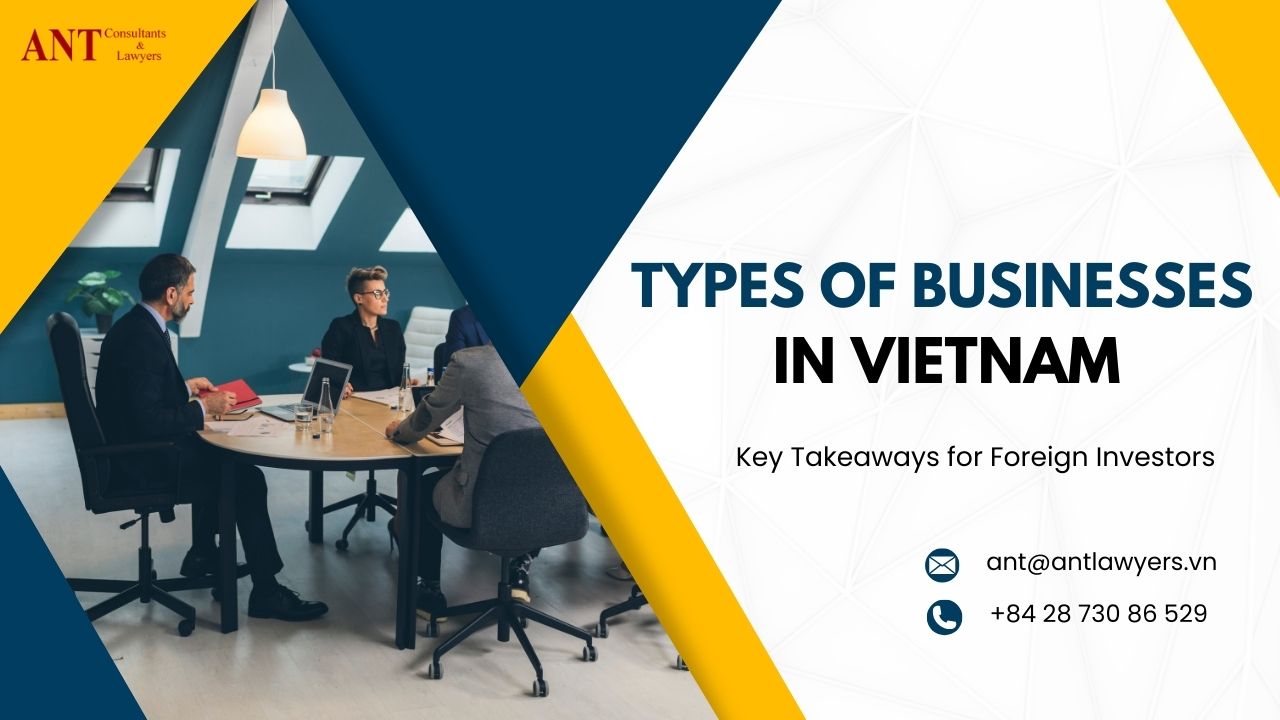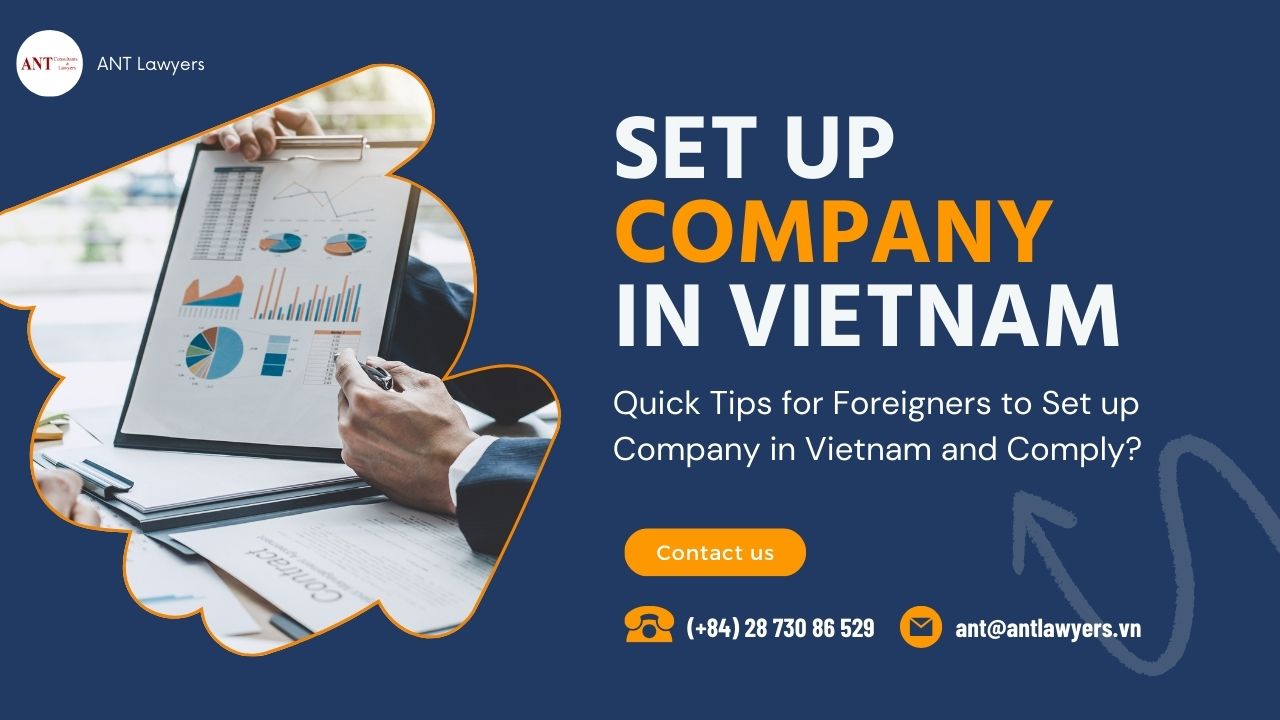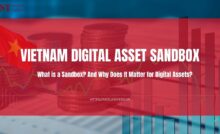How to Choose Right Types of Businesses in Vietnam? 5 Crucial Decisions


Choosing the Right Types of Businesses in Vietnam: A Comprehensive Analysis
The decision of choosing the right types of businesses in Vietnam is critical for entrepreneurs and investors entering the country’s vibrant economy. With its strategic location in Southeast Asia, growing market potential, and government incentives for businesses, Vietnam has become a hotspot for foreign and local investments alike. However, the choice of business structures significantly influences an enterprise’s legal, financial, and operational outcomes.
In here we look into the factors that affect this crucial decision, the types of business entities available, the regulations regarding foreign ownership, and practical advice for entrepreneurs to make informed choices.

Understanding the Importance of Choosing the Right Types of Businesses in Vietnam
Vietnam’s legal framework provides several options for businesses, each with distinct characteristics, benefits, and drawbacks. From sole proprietorships to joint-stock companies, the process of choosing the right types of businesses in Vietnamdetermines how a company is managed, its liability exposure, its ability to attract investment, and its taxation obligations.
Entrepreneurs need to assess these options carefully, as the chosen structures often dictate the success or failure of a venture.
Key factors to consider include:
1. Legal Liability: Different business types offer varying levels of liability protection for business owners.
2. Tax Obligations: Certain structures may benefit from favorable tax regimes, while others face higher tax burdens.
3. Operational Complexity: Some business types require intricate compliance and reporting mechanisms.
4. Scalability:The ease of attracting additional investors or partners depends largely on the chosen structure.
Failing to address these aspects when choosing the right types of businesses in Vietnam can lead to significant challenges, including financial losses and legal complications.
Types of Business Structures in Vietnam
Vietnamese law recognizes several business structures, each suited for different purposes and scales. Below, we analyze the most common options:
1. Sole Proprietorships
Sole proprietorships are one of the simplest types of businesses in Vietnam, requiring minimal capital and administrative efforts. The owner has full control over the business but bears unlimited liability for its debts. This makes sole proprietorships ideal for small-scale operations or individual entrepreneurs.
Advantages:
• Quick and inexpensive to establish.
• Full control over decision-making.
Disadvantages:
• Unlimited liability, exposing personal assets to risk.
• Limited ability to scale or attract external investment.
Given these characteristics, sole proprietorships are increasingly rare among modern entrepreneurs who are cautious about liability risks. As such, more people are exploring alternatives when choosing the right types of businesses in Vietnam.
2. Limited Liability Companies (LLC)
LLCs are the most popular choice among entrepreneurs in Vietnam, offering liability protection to owners while maintaining relatively straightforward governance. LLCs can either be single-member (owned by one individual or entity) or multi-member (with up to 50 members).
Advantages:
• Limited liability, restricting owners’ financial risk to their capital contributions.
• Flexible management structure.
Disadvantages:
• Restrictions on transferring ownership in single-member LLCs.
• Limited ability to raise capital compared to corporations.
For entrepreneurs, especially foreigners choosing the right types of businesses in Vietnam, LLCs are particularly attractive due to their balance of simplicity and legal protection.
3. Joint-Stock Companies (JSCs)
Joint-stock companies are more complex structures suitable for larger businesses or those planning to raise capital through public or private offerings. JSCs allow for unlimited shareholders, and ownership is divided into shares.
Advantages:
• Ideal for raising capital through equity markets.
• Ownership can be transferred freely via shares.
Disadvantages:
• Higher administrative and compliance costs.
• Complex governance structures requiring board meetings and shareholder voting.
JSCs are often the best option for businesses planning long-term growth or aiming to attract significant investments. Entrepreneurs seeking scalability often prioritize JSCs when choosing the right types of businesses in Vietnam.
4. Partnerships
Partnerships are relatively rare in Vietnam, used mainly in specific industries like law or accounting. This type of business requires at least two general partners, who bear unlimited liability, and allows for additional limited partners with restricted liability.
Advantages:
• Suitable for professional services requiring close cooperation among partners.
• Flexibility in decision-making.
Disadvantages:
• Unlimited liability for general partners.
• Limited appeal to investors due to governance restrictions.
While partnerships are not a common choice for startups, they may be unavoidable in certain regulated professions, leaving fewer options when choosing the right types of businesses in Vietnam.
Foreign Ownership in Different Types of Businesses in Vietnam
One of the most critical considerations for foreign investors when choosing the right types of businesses in Vietnam is the extent of foreign ownership allowed. Vietnam’s legal framework has specific provisions for foreign investors that vary by industry and business type.
1. Limited Liability Companies (LLC)
Foreign investors are allowed to fully own LLCs in many sectors. However, certain industries, such as telecommunications, banking, and logistics, impose restrictions on foreign ownership, requiring joint ventures with local partners.
Advantages for Foreign Investors:
• Flexibility to establish wholly foreign-owned enterprises (WFOEs) in permitted sectors.
• Straightforward setup process compared to CTCPs.
Challenges:
• Restrictions in sensitive industries.
• Dependence on local partners in restricted sectors.
2. Joint-Stock Companies
JSCs offer foreign investors opportunities to participate in publicly listed companies or establish private JSCs. Foreign ownership in public JSCs is capped at 49% in most cases, although exceptions exist in sectors like banking, where the limit is lower.
Advantages for Foreign Investors:
• Access to Vietnam’s capital markets.
• Ability to transfer shares freely.
Challenges:
• Strict compliance and reporting requirements.
• Ownership caps limiting foreign influence.
4. Representative Offices (ROs)
Representative Offices are not considered as one types of businesses in Vietnam because ROs are not considered a business, nor legal entity. ROs are acting on behalf of foreign trader. For foreign businesses not ready to establish full-fledged operations, setting up representative offices in Vietnam offer a low-risk entry point. These offices cannot conduct revenue-generating activities but are suitable for market research, liaison, and brand representation. ROs could rent offices, hire employee to conduct their operation.
Advantages:
• Simplified setup process.
• No capital requirements.
Challenges:
• Limited operational scope.
• Unsuitable for generating revenue.
Key Takeaways for Foreign Investors
For foreign investors, choosing the right types of businesses in Vietnam involves balancing opportunities and regulatory challenges. Conducting thorough due diligence, seeking legal counsel, and collaborating with local experts are essential steps to ensure success.
Whether opting for a wholly foreign-owned enterprise, a joint venture, or a representative office, the decision should align with the investor’s goals, industry requirements, and Vietnam’s regulatory landscape.
Future Trends in Choosing the Right Types of Businesses in Vietnam
Vietnam’s dynamic economy continues to evolve, and so do the considerations for choosing the right types of businesses in Vietnam.
1. Vietnam’s Push for Digital Transformation
The Vietnamese government has identified digital transformation as a key driver of economic growth. As such, startups and tech-focused enterprises are becoming increasingly attractive for investment.
When choosing the right types of businesses in Vietnam, entrepreneurs should consider leveraging technology to enhance operational efficiency and scalability. Joint-stock companies (JSCs) are expected to dominate the tech sector due to their ability to raise capital through equity markets and attract foreign investors.
For foreign investors, the opportunity to establish wholly foreign-owned enterprises (WFOEs) in technology-related sectors makes Vietnam a prime destination. However, these opportunities come with challenges, such as navigating intellectual property laws and complying with cybersecurity regulations.
2. Growing Focus on Sustainability
Sustainability is becoming a priority for businesses in Vietnam as the government pushes for greener economic practices. Industries such as renewable energy, waste management, and sustainable agriculture are receiving increased attention and incentives. This creates a fertile ground for new businesses in these fields.
Entrepreneurs choosing the right types of businesses in Vietnam in the sustainability sector must evaluate the long-term benefits of government subsidies and incentives. For instance, forming a limited liability company (LLC) could allow small renewable energy firms to test their operations with minimal liability risks before scaling up into a joint-stock company to attract large-scale investments.
Additionally, partnerships and joint ventures between foreign investors and local companies are on the rise in the sustainability sector. This approach not only mitigates regulatory challenges but also ensures access to local expertise and networks.
3. Rising Importance of E-commerce
Vietnam’s e-commerce market is experiencing exponential growth. The rise of online shopping, digital payment systems, and logistics innovations makes the e-commerce sector an attractive option for entrepreneurs and investors alike.
For startups entering the e-commerce space, choosing the right types of businesses in Vietnam is critical for navigating competition and scaling operations. LLCs provide a flexible and low-risk structure for small e-commerce ventures, while joint-stock companies are ideal for platforms aiming to secure venture capital or go public.
Foreign companies seeking to tap into Vietnam’s e-commerce market must be mindful of regulations on cross-border transactions, data protection, and logistics. Setting up a representative office to study the market before launching operations can help mitigate these risks.
4. Challenges in a Globalized Economy
While Vietnam offers immense opportunities, it also presents challenges tied to globalization. Trade tensions, supply chain disruptions, and geopolitical factors can affect business operations. Entrepreneurs choosing the right types of businesses in Vietnam must consider how external factors may influence their industries.
One way to address these challenges is by diversifying partnerships and supply chains. Businesses can explore joint ventures to reduce dependence on a single market or supply source. Additionally, understanding Vietnam’s free trade agreements (FTAs), such as the Comprehensive and Progressive Agreement for Trans-Pacific Partnership (CPTPP), can open doors to international markets.
5. Recommendations for Aspiring Entrepreneurs
For entrepreneurs looking to succeed in Vietnam’s competitive market, the following steps are essential when choosing the right types of businesses in Vietnam:
• Conduct thorough market research: Understand consumer preferences, industry trends, and competitors.
• Evaluate scalability options: Start small with an LLC or sole proprietorship but plan for future transitions to larger structures like CTCPs.
• Seek professional guidance: Consult legal and financial experts to ensure compliance with local laws and regulations.
• Leverage government incentives: Explore tax breaks, subsidies, and other support programs available for specific industries.
• Build a strong local network: Collaborate with local partners to navigate cultural and regulatory nuances effectively.
The Road Ahead
As Vietnam continues to emerge as a regional economic powerhouse, entrepreneurs and investors have a unique opportunity to capitalize on its growing market. Choosing the right types of businesses in Vietnam will remain a pivotal decision that defines a company’s success. By staying informed about legal frameworks, industry trends, and future opportunities, businesses can position themselves for long-term growth and sustainability.
Whether entering the tech, sustainability, e-commerce, or traditional sectors, Vietnam offers a fertile ground for innovation and success. However, success requires careful planning, adaptability, and a thorough understanding of the country’s regulatory and economic landscape. With the right strategies, businesses can thrive in Vietnam’s dynamic and competitive environment.
About ANT Lawyers, a Law Firm in Vietnam
We help clients overcome cultural barriers and achieve their strategic and financial outcomes, while ensuring the best interest rate protection, risk mitigation and regulatory compliance. ANT lawyers has lawyers in Ho Chi Minh city, Hanoi, and Danang, and will help customers in doing business in Vietnam.
How ANT Lawyers Could Help Your Business?
You could reach ANT Lawyers in Vietnam for advice via email ant@antlawyers.vn or call our office at (+84) 24 730 86 529
Recent Posts
5 Powerful Reasons Why Vietnam Digital Asset Sandbox Is a Bold and Hopeful Move for Innovation
Change is fast. Rules are slow. But innovation can’t wait. As digital assets grow, so…
4 Critical Steps to Effectively Terminate The Employment Contracts with Confidence and Compassion
To terminate the employment contracts can be a complex and often sensitive process, especially when…
8 Insights from a Due Diligence Attorneys in Vietnam for Successful M&A Deals
Navigating the complex landscape of mergers and acquisitions (M&A) in Vietnam can be a daunting…
What 7 Crucial Truths About Arbitration in Vietnam Every Foreign Company Must Know Today?
Let's face the fact, as business owners or directors, would you normally look at dispute…
7 Crucial Legal Challenges Fintech Law Firms in Vietnam Can Help You Overcome for Business Success
Vietnam’s fintech sector is experiencing rapid growth, catching up with the trend of digital financial…
7 Reasons to Set Up a Subsidiary in Vietnam Now: A Powerful and Timely Move Amid Global Shifts
Introduction: The World Is Changing Fast, So Should Your Strategy When the world becomes unpredictable,…





